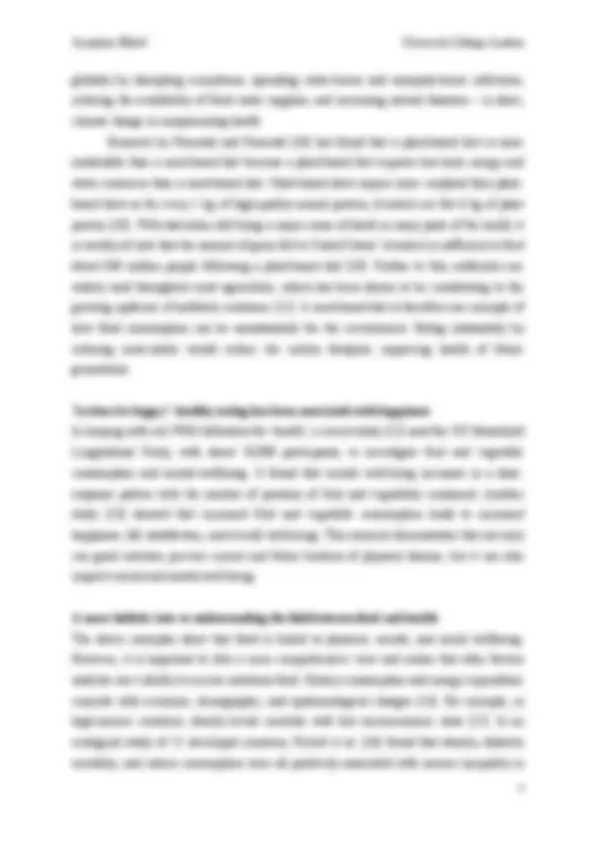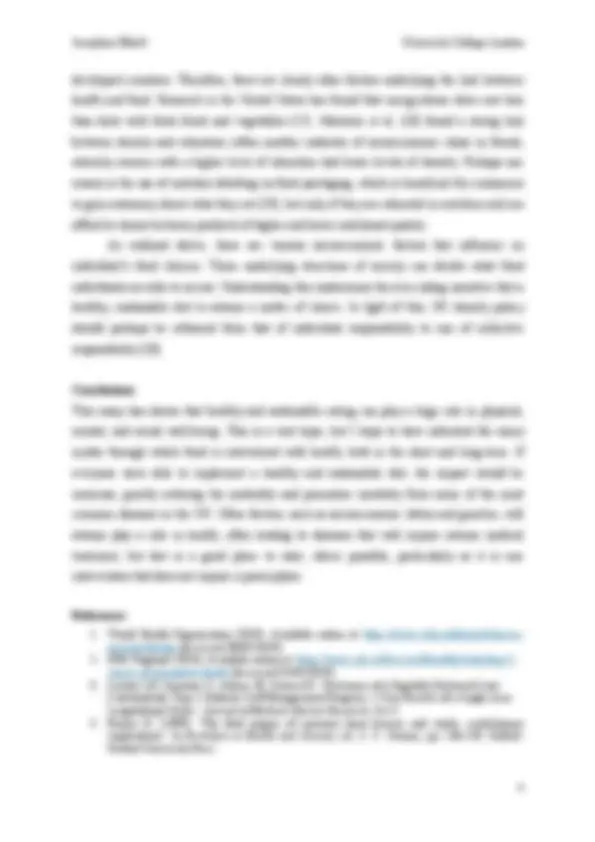





Study with the several resources on Docsity

Earn points by helping other students or get them with a premium plan


Prepare for your exams
Study with the several resources on Docsity

Earn points to download
Earn points by helping other students or get them with a premium plan
Community
Ask the community for help and clear up your study doubts
Discover the best universities in your country according to Docsity users
Free resources
Download our free guides on studying techniques, anxiety management strategies, and thesis advice from Docsity tutors
The relationship between food and health, arguing that while food is crucial for good health, dietary choices are influenced by socioeconomic factors. The essay discusses various health conditions linked to diet, the benefits of a Paleolithic diet, and the importance of sustainable eating. It also highlights the impact of food consumption on the environment and mental well-being.
What you will learn
Typology: Assignments
1 / 5

This page cannot be seen from the preview
Don't miss anything!




“Is food the foundation for good health?” Use this essay to radically and critically consider the role of nutrition in healthcare. Please use examples to illustrate your arguments. Good health, in the words of the World Health Organisation, is the absence of disease as well as “a state of complete physical, mental, and social well-being” [1]. This essay will use evolutionary biology and sustainability arguments to illustrate why having a healthy and balanced diet is important for a holistic sense of well-being. I will, however, temper the notion that food itself is the foundation for good health as diet is often a consequence of a multitude of socioeconomic factors. As such, this essay will not only present a case for the importance of food, but also explore some of the factors underpinning our dietary choices. Can eating 5-a-day really keep the doctor away? Many of the conditions that cause the greatest morbidities in the world today have been directly linked to diet: cardiovascular disease, diabetes mellitus type II, coeliac disease, irritable bowel syndrome, hypertension, strokes, osteoporosis, fatty liver disease, hypothyroidism secondary to iodine deficiency, et cetera. According to NHS England, heart disease and stroke are in the top three causes of premature death in the UK and both can be mitigated with good diet and exercise [ 2 ]. For example, atherosclerosis is the most common cause of cardiovascular disease and it is due to an accumulation of cholesterol in the walls of blood vessels. Therefore, by reducing cholesterol in one’s diet, you can reduce your risk of cardiovascular disease. Another major cause of morbidity and mortality is diabetes, which can also be modified with a healthy diet. Early dietary interventions in pre-diabetes have been shown to reduce the risk of developing type II diabetes mellitus and some studies now show that a carbohydrate-reduced diet may even cure type II diabetes mellitus [ 3 ]. Even before birth, nutrition has a role to play in our health. Barker [ 4 ] demonstrated a strong correlation between poor maternal nutrition in pregnancy and developing obesity or type II diabetes mellitus later in life. He theorised that the foetus uses the prenatal conditions to predict what the environment after birth will be like, therefore reducing their metabolic rate to buffer undernutrition; this makes the person more susceptible to obesity and related chronic diseases. All this research shows that food has a critical role to play in determining the lifetime health of an individual.
Lessons from the past: evolutionary medicine and our diet Food is not only an integral part of our individual growth, but also of our development as a species. By carrying out investigations on the Paleolithic diet of hunter-gatherers, which is characterised by high levels of lean meat and plant-based foods, Eaton and Konner [ 5 ] found that this diet was broadly similar to contemporary dietary recommendations. Our innate preference for sugars and fat was designed to avail humans when they lived as hunter- gatherers in the African savanna 10,000 years ago. In these conditions, such foods were rare and individuals would often have to walk for hours to get any food – gorging on sugar and fat when available was an evolutionary mechanism to prevent starvation during periods of famine. Unfortunately, with the ease of access to calorific food in today’s world, this genetic predisposition towards sugar and fat consumption leads to diseases associated with obesity. Our bodies were designed to eat the calorie-poor diet of ancient hunter-gatherers, a diet that we no longer follow. Through numerous clinical studies [ 6 - 8 ], the Paleolithic diet has been shown to cause marked improvements in risk reduction for chronic conditions, such as diabetes, hypertension and obesity. For example, Frassetto et al. [ 7 ] conducted a study with nine non-obese American adults, comparing the effects of a contemporary United States diet with that of a reproduced Paleolithic diet. The method involved putting participants on a ‘ramp up’ diet for seven days with increased potassium and fibre, followed by a Paleolithic-style diet of lean meat, fruit, vegetables, and nuts for ten days. Blood pressure and urine tests were carried out throughout and the researchers found marked improvements in monitored health indicators, including significant reductions in blood pressure, improved insulin sensitivity, and significant reductions in cholesterol. Although this was a small sample size, these results strongly suggest that a Paleolithic diet causes metabolic and physiologic improvements, which can prevent chronic metabolic and cardiovascular diseases. Adopting a Paleolithic diet may therefore help tackle the current widespread pandemic of nutrition-related chronic diseases. This evidences the importance of eating food that our bodies are evolutionarily designed for and the capacity for such food to improve and maintain health. Why eating sustainably would benefit the health of future generations Friends of the Earth [9] have shown that, in the UK, agriculture is responsible for 10% of greenhouse gas emissions, 83% of ammonia air pollution, and 16% of water pollution. These statistics matter because climate change is having an immense impact on disease patterns
developed countries. Therefore, there are clearly other factors underlying the link between health and food. Research in the United States has found that energy-dense diets cost less than diets with fresh fruits and vegetables [1 7 ]. Monteiro et al. [1 8 ] found a strong link between obesity and education (often another indicator of socioeconomic class) in Brazil, whereby women with a higher level of education had lower levels of obesity. Perhaps one reason is the use of nutrition labelling on food packaging, which is beneficial for consumers to gain autonomy about what they eat [1 9 ], but only if they are educated in nutrition and can afford to choose between products of higher and lower nutritional quality. As outlined above, there are various socioeconomic factors that influence an individual’s food choices. These underlying structures of society can dictate what food individuals are able to access. Understanding this undermines the over-riding narrative that a healthy, sustainable diet is always a matter of choice. In light of this, UK obesity policy should perhaps be reframed from that of individual responsibility to one of collective responsibility [ 20 ]. Conclusions This essay has shown that healthy and sustainable eating can play a huge role in physical, mental, and social well-being. This is a vast topic, but I hope to have indicated the many modes through which food is intertwined with health, both in the short and long-term. If everyone were able to implement a healthy and sustainable diet, the impact would be immense, greatly reducing the morbidity and premature mortality from some of the most common diseases in the UK. Other factors, such as socioeconomic status and genetics, will always play a role in health, often leading to diseases that will require intense medical treatment, but diet is a good place to start, where possible, particularly as it is one intervention that does not require a prescription. References: